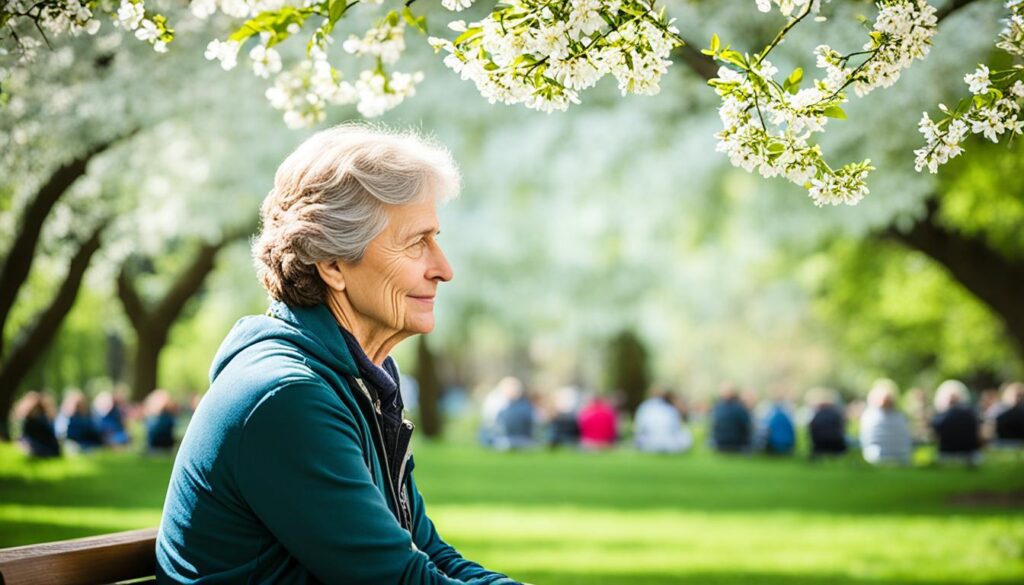Beauty standards can have a profound impact on mental health. Negative body image, often influenced by unrealistic beauty ideals promoted in media and advertising, can lead to feelings of shame, anxiety, and self-consciousness. Women are particularly vulnerable to negative body image, as they are constantly bombarded with messages that their appearance is the most important aspect of their identity. This can result in disordered eating, suicidal thoughts, anxiety, depression, and low self-esteem. Developing a positive body image takes time and effort, but it is crucial for maintaining good mental health.
Key Takeaways:
- Negative body image can lead to feelings of shame, anxiety, and self-consciousness.
- Women are particularly vulnerable to negative body image due to societal pressures.
- Negative body image is strongly associated with disordered eating, suicidal thoughts, anxiety, depression, and low self-esteem.
- Developing a positive body image requires effort and can improve mental well-being.
What is Body Image and How Does it Influence Mental Health?
Body image refers to your thoughts, perceptions, and attitudes towards your physical appearance. It can either be positive or negative. Positive body image involves feeling comfortable and confident in your body, and accepting it as it is. On the other hand, negative body image is characterized by feelings of shame, anxiety, and self-consciousness about your appearance.
Negative body image can have a significant impact on your mental health. It can contribute to various issues such as disordered eating, suicidal thoughts, anxiety, depression, and low self-esteem. Constantly comparing yourself to unrealistic beauty ideals portrayed in media and advertising can fuel these negative perceptions of your body.
It’s important to note that women are more likely to experience negative body image than men due to societal pressures and the perpetuation of unrealistic beauty standards. Media and advertising often portray an idealized version of beauty that is unattainable for most people.
Having a negative body image can make you feel insecure and dissatisfied with your appearance, leading to a range of mental health challenges. It’s crucial to recognize the impact that body image has on your well-being and take steps towards cultivating a healthier relationship with your body.
The Influence of Unrealistic Beauty Standards on Mental Health
Unrealistic beauty standards, often perpetuated by media and advertising, can have detrimental effects on mental health. These standards create a distorted view of what is considered beautiful or desirable, leading to body dissatisfaction and negative self-perception. Body dissatisfaction is strongly associated with the development of eating disorders, such as anorexia nervosa and bulimia nervosa, as well as depression. The constant comparison to unrealistic beauty ideals can instil feelings of inadequacy, shame, and a desire to alter one’s appearance through extreme measures. It is crucial to challenge and raise awareness about these unrealistic standards to promote mental well-being.
The Impact of Unrealistic Beauty Standards
Unrealistic beauty standards set an unattainable benchmark for individuals, leading to a range of mental health issues. The relentless pursuit of the “perfect” body can cause immense stress, anxiety, and dissatisfaction with one’s appearance. According to research, exposure to media images portraying idealized bodies can significantly increase body dissatisfaction and drive feelings of inadequacy.
Body dissatisfaction, in turn, paves the way for the development of eating disorders. The constant pressure to conform to unrealistic beauty ideals can push individuals towards extreme dieting, restrictive eating patterns, and even self-harm. Eating disorders, such as anorexia nervosa and bulimia nervosa, not only impact physical health but also take a severe toll on mental well-being.
Mental health issues related to unrealistic beauty standards are not limited to eating disorders. Depression and anxiety often coexist with body dissatisfaction, as individuals constantly compare themselves to unattainable beauty ideals. The never-ending cycle of self-criticism and negative self-image can lead to a profound sense of despair, hopelessness, and low self-esteem.
Challenging Unrealistic Beauty Standards for Mental Well-being
To combat the negative impact of unrealistic beauty standards on mental health, it is essential to challenge and redefine societal beauty ideals. A shift towards body positivity, inclusivity, and acceptance can help individuals develop a healthier relationship with their bodies and improve mental well-being.
“Body positivity is about accepting and appreciating your body as it is, regardless of how closely it aligns with societal standards.”
In addition to challenging beauty standards, promoting self-acceptance and self-love is crucial. Recognizing and appreciating the uniqueness and functionality of one’s body can foster a positive body image and improve overall mental health.
Social media plays a significant role in perpetuating unrealistic beauty ideals. It is essential to curate our social media feeds by unfollowing accounts that promote harmful beauty standards and instead following body-positive influencers who celebrate diverse body types. Taking a social media detox can also alleviate the pressure to conform to unrealistic standards and allow individuals to focus on their well-being and self-acceptance.
Introducing Mindfulness and Self-Care
Mindfulness can be a powerful tool for managing negative body image and promoting mental well-being. By practising mindfulness, individuals can cultivate self-compassion, observe their thoughts without judgment, and redirect negative self-talk towards positive affirmations.
Engaging in self-care activities that prioritize mental and emotional well-being can also contribute to developing a positive body image. This can include activities such as meditation, journaling, seeking therapeutic support, and engaging in hobbies or physical activities that promote self-esteem and self-worth.
| Impact of Unrealistic Beauty Standards on Mental Health | Eating Disorders | Depression and Anxiety |
|---|---|---|
| Body dissatisfaction | Extreme dieting | Feelings of inadequacy |
| Low self-esteem | Restrictive eating patterns | Hopelessness |
| Anxiety | Self-harm | Despair |
The Relationship Between Body Image and Mental Health Disorders
Body image plays a significant role in the development and exacerbation of various mental health disorders. Negative body image, characterized by dissatisfaction and self-consciousness about one’s appearance, can contribute to low self-esteem, which is often a precursor to mental health disorders such as eating disorders and depression.
When individuals have a negative body image, they may engage in unhealthy behaviours in an attempt to conform to societal beauty standards. This can include extreme dieting, excessive exercise, or even resorting to harmful practices. These actions can have severe consequences for their mental well-being, exacerbating their negative self-perception and increasing the risk of developing mental health disorders.
For individuals struggling with negative body image, the constant dissatisfaction and self-consciousness can take a toll on their self-esteem. This can contribute to feelings of inadequacy, worthlessness, and a distorted perception of their worth beyond physical appearance.
“Having a negative body image can significantly impact your mental health. It can contribute to the development of eating disorders, such as anorexia and bulimia, as well as depression. It is important to address these issues and seek professional help when needed.”
Eating disorders are often associated with negative body image. The constant comparison to unrealistic beauty ideals can drive individuals to adopt extreme eating habits in an attempt to achieve an unattainable body shape or size. This can lead to various health complications and further exacerbate their mental health.
Depression is another mental health disorder that can be influenced by negative body image. The constant dissatisfaction and self-judgment can weigh heavily on an individual’s mental well-being, leading to feelings of sadness, hopelessness, and a loss of interest in activities they once enjoyed.
It is important to recognize the damaging effects of negative body image on mental health and take proactive steps to address and improve it. Prioritizing self-care, promoting self-acceptance, and seeking professional help when needed are essential for fostering positive mental well-being.
Remember, you are more than your physical appearance. Your worth extends far beyond societal beauty standards. Focus on building a healthy and positive relationship with your body and seek support if you’re struggling with body image issues.
Statistics on Mental Health Disorders and Body Image
| Mental Health Disorder | Prevalence |
|---|---|
| Eating Disorders | Approximately 9% of the global population |
| Depression | Over 264 million people worldwide |
Challenging Unrealistic Beauty Standards for Better Mental Health
Challenging beauty standards is vital for nurturing better mental health. In a society that often promotes unattainable ideals, it is crucial to promote body positivity and self-acceptance. Take a step back and reflect on the fact that everyone’s body is unique, and there is no such thing as a “perfect” body type.
One effective way to challenge unrealistic beauty standards is by disconnecting from social media accounts that constantly reinforce these unattainable ideals. Social media detox can be incredibly liberating and help you focus on your self-worth, rather than comparing yourself to others.
Surrounding yourself with positive influences is another key aspect of challenging beauty standards. Seek out individuals and communities that promote self-acceptance and body positivity. Engaging in activities that prioritize self-care and self-love can also contribute significantly to improved mental well-being.
“It’s time to reject the notion that our worth is determined by our appearance. Let’s celebrate and embrace the beauty of diversity.”
By taking steps to challenge and change societal beauty standards, we can work towards creating a more inclusive and body-positive culture. Embrace your uniqueness, celebrate your individuality, and prioritize your mental well-being.
Ways to Challenge Unrealistic Beauty Standards:
- Practice self-acceptance and self-love
- Avoid comparing yourself to others
- Disconnect from social media accounts that promote unrealistic ideals
- Surround yourself with positive influences
- Engage in activities that prioritize self-care
Building a Positive Body Image for Better Mental Health
Building a positive body image is crucial for maintaining good mental health. It involves practising self-compassion and self-acceptance, recognizing the unique qualities and talents that go beyond physical appearance.
One way to cultivate self-compassion is through mindfulness. By being present in the moment and paying attention to your thoughts and emotions without judgment, you can identify and manage negative thoughts and feelings related to body image. Mindfulness techniques, such as meditation or deep breathing exercises, can help you develop a more positive and accepting attitude towards your body.
Surrounding yourself with supportive and positive influences is also important for building a positive body image. Friends and family who appreciate your worth beyond physical appearance can serve as a source of encouragement and validation. Connecting with individuals who uplift and celebrate your unique qualities can reinforce self-acceptance and foster a healthier relationship with your body.
“Surround yourself with only people who are going to lift you higher.” – Oprah Winfrey
Remember, it’s crucial to focus on the functionality and capabilities of your body rather than its appearance. Understanding that your body allows you to engage in activities you enjoy, experience the world, and achieve your goals can help shift your perspective towards a more positive body image.
By practising self-compassion, self-acceptance, and mindfulness, and surrounding yourself with positive influences, you can build a positive body image that contributes to better mental health.

| Benefits of a Positive Body Image | Effects of a Negative Body Image |
|---|---|
|
|
Seeking Help for Mental Health Issues Related to Body Image
When it comes to mental health issues related to body image, seeking help is essential. Don’t struggle on your own – reach out to trusted professionals who can provide the guidance and support you need. Psychologists and therapists are trained to help individuals improve their body image, address underlying issues that contribute to negative self-perception, and provide treatment for any mental health disorders that may have developed as a result of body image issues.
Seeking help for your mental well-being is a proactive step towards finding long-term solutions. These professionals can assist you in developing strategies to improve your body image and navigate the challenges associated with it. They create a safe and supportive space where you can openly discuss your concerns and develop coping mechanisms to address them.
Remember, you don’t have to face these challenges alone. Seeking professional intervention allows you to access the expertise and knowledge necessary for your journey towards improved mental well-being. They can help you cultivate a healthier relationship with your body and work towards building a positive body image.
“Seeking help for your mental health is not a sign of weakness; it is a sign of strength and a commitment to your well-being.”
Don’t hesitate to seek the assistance of mental health professionals who specialize in body image issues. Whether it’s through therapy, counselling, or other forms of support, the guidance and understanding they provide can make a significant difference in your mental health journey.
Remember, mental health support is available, and you deserve the help you need to overcome body image issues. Embrace the power of seeking professional intervention and take the necessary steps towards cultivating a positive body image and improving your overall well-being.

Finding the Right Mental Health Professional
When seeking help for mental health issues related to body image, it’s crucial to find the right professional who can understand and address your specific concerns. Here are some steps to help you find the appropriate mental health support:
- Research and seek recommendations: Start by researching mental health professionals who specialize in body image issues. You can ask your primary care physician for recommendations or seek referrals from friends, family, or support groups.
- Check credentials: Ensure that the mental health professional you choose is licensed and qualified to provide the support you need. Look for certifications, degrees, and experience in treating body image issues.
- Consider therapy approach: Different therapists may use different therapeutic approaches, such as cognitive-behavioural therapy (CBT), dialectical behaviour therapy (DBT), or other evidence-based practices. Research these approaches and consider which one aligns with your needs and preferences.
- Connect personally: It’s essential to feel comfortable and trust the mental health professional you choose. Consider scheduling an initial consultation or phone call to gauge your compatibility before committing to ongoing sessions.
- Insurance coverage and affordability: Review your insurance coverage and consider the financial aspects of therapy. Some mental health professionals offer sliding scale fees or payment plans to accommodate different financial situations.
Finding the right mental health professional may take time, but it’s worth the effort. Remember that seeking help is a courageous step towards prioritizing your mental health and finding the support you deserve.
Conclusion
The impact of beauty standards on mental health is undeniable. Negative body image, influenced by unrealistic beauty ideals, can lead to a range of mental health issues, including anxiety, depression, and low self-esteem. To combat these detrimental effects, it is essential to challenge and redefine societal beauty standards.
Promoting body positivity and practising self-acceptance are crucial for maintaining good mental well-being. Embrace the uniqueness of your body and recognize that your worth extends far beyond physical appearance. Surround yourself with positive influences that appreciate your individuality and focus on the functionality and capabilities of your body rather than its appearance.
Seeking help and support when struggling with body image issues is vital. Reach out to trusted professionals who can provide guidance, strategies, and treatment options. By addressing underlying issues and seeking professional intervention, you can find effective solutions to improve your mental well-being.
Let’s work towards a more inclusive and body-positive culture. Together, we can create an environment that nurtures mental wellness in the face of societal pressures. Remember, you have the power to prioritize your mental health and embrace self-acceptance. Seek help when needed and take proactive steps towards a positive and fulfilling life.
FAQ
How do beauty standards impact mental health?
Beauty standards can have a profound impact on mental health, leading to negative body image, feelings of shame, anxiety, and self-consciousness. They can contribute to disordered eating, suicidal thoughts, anxiety, depression, and low self-esteem.
What is body image and how does it influence mental health?
Body image refers to one’s thoughts, perceptions, and attitudes towards their physical appearance. Positive body image involves feeling comfortable and confident in one’s body, while negative body image is characterized by shame, anxiety, and self-consciousness. Negative body image can lead to various mental health issues, including disordered eating, suicidal thoughts, anxiety, depression, and low self-esteem.
How do unrealistic beauty standards impact mental health?
Unrealistic beauty standards perpetuated by media and advertising can have detrimental effects on mental health. They create body dissatisfaction and negative self-perception, leading to eating disorders, such as anorexia nervosa and bulimia nervosa, as well as depression.
What is the relationship between body image and mental health disorders?
Negative body image can contribute to low self-esteem, which is often a precursor to mental health disorders such as eating disorders and depression. Unhealthy behaviours, such as extreme dieting or excessive exercise, are common among individuals with negative body image.
How can we challenge unrealistic beauty standards for better mental health?
Challenging unrealistic beauty standards involves promoting body positivity, and self-acceptance, and disconnecting from social media accounts that promote unattainable ideals. Raising awareness and changing societal beauty standards can create a more inclusive and body-positive culture.
How can we build a positive body image for better mental health?
Building a positive body image involves practising self-compassion and self-acceptance, recognizing the unique qualities and talents that go beyond physical appearance. Mindfulness and surrounding oneself with positive influences can also contribute to a positive body image.
How important is seeking help for mental health issues related to body image?
Seeking help is essential for individuals struggling with mental health issues related to body image. Professionals, such as psychologists or therapists, can provide guidance, support, and treatment for any mental health disorders that may have developed as a result of body image issues.
Why is it important to prioritize mental health amidst beauty standards?
Prioritizing mental health is crucial for maintaining overall well-being. By challenging unrealistic beauty standards, promoting self-acceptance, and seeking help when needed, individuals can foster a more positive and inclusive body image, leading to better mental health.





